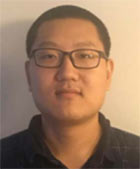Sep
20

Date: 20 September 2023
Time: 11:00 AM ET (New York Time)
Speaker(s): Dr. Xudong Zhang, Dr. Fangzhou Wang, Dr. Hongbin Li
Abstract
We consider the problem of locating multiple targets using automotive radar by exploiting a pair of cooperative vehicles, which form a mono- and bi-static sensing system to provide spatial diversity for localization. In this webinar, we present an efficient two-step method that first determines initial target locations using delay and angle estimates from each individual system, and subsequently refines them via an association and fusion step. Specifically, we use a 2-dimensional (2-D) fast Fourier transform (FFT) based approach to obtain the initial target delay and angle estimates for each system, which are then sorted and paired via a minimum distance criterion. Finally, the initial location estimates are fused/weighted according to the target strength observed by each system. This cooperative approach yields improved performance over non-cooperative approaches using only the mono-static or bi-static sensing system. In addition to the two-step method, we will also discuss an alternative solution that exploits the fact that the received signals in both the mono- and bi-static systems are jointly sparse in the parameter (target location) space. This enables multitarget localization to be reformulated as a group sparse recovery problem.
Biography
 Xudong Zhang (M’22) received the B.S. degree from Beijing Institute of Technology, Beijing, China, in 2016, the M.S. and Ph.D. degree from Stevens Institute of Technology, Hoboken, NJ, USA, in 2017 and 2022, respectively, all in electrical engineering.
Xudong Zhang (M’22) received the B.S. degree from Beijing Institute of Technology, Beijing, China, in 2016, the M.S. and Ph.D. degree from Stevens Institute of Technology, Hoboken, NJ, USA, in 2017 and 2022, respectively, all in electrical engineering.
He has been working on digital signal processing as a DSP Engineer with Aeva, an FMCW LIDAR company, Mountain View, CA, USA since 2022. From 2018 to 2022 he worked as a Research and Teaching Assistant in the Department of Electrical and Computer Engineering, Stevens Institute of Technology. His research interests include signal processing, passive sensing, detection, and estimation.
 Fangzhou Wang (M'22) received the B.S. and M.S. degrees from Beijing Institute of Technology, Beijing, China in 2012 and 2015, respectively, and the Ph.D. degree from Stevens Institute of Technology, Hoboken, NJ, in 2022, all in electrical engineering.
Fangzhou Wang (M'22) received the B.S. and M.S. degrees from Beijing Institute of Technology, Beijing, China in 2012 and 2015, respectively, and the Ph.D. degree from Stevens Institute of Technology, Hoboken, NJ, in 2022, all in electrical engineering.
He is currently a postdoctoral scholar with the Department of Electrical Engineering and Computer Science at University of California Irvine, CA. His research interests include statistical signal processing and convex optimization, with emphasis on wireless communications and radar signal processing.
Dr. Wang received the Outstanding Ph.D. Dissertation Award in Electrical Engineering in 2022, the Paul Kaplan Award for Distinguished Doctoral Work in 2022, and the Outstanding Research Assistant Award in 2018, all from Stevens Institute of Technology.
 Hongbin Li (M'99-SM'08-F'19) received the B.S. and M.S. degrees from the University of Electronic Science and Technology of China, in 1991 and 1994, respectively, and the Ph.D. degree from the University of Florida, Gainesville, FL, in 1999, all in electrical engineering. He is currently the Charles and Rosanna Batchelor Memorial Chair Professor with the Department of Electrical and Computer Engineering, Stevens Institute of Technology, Hoboken, NJ, since July 1999. His general research interests include statistical signal processing, wireless communications, and radars. Dr. Li is a fellow of the Asia-Pacific Artificial Intelligence Association (AAIA). He received Provost's Award for Research Excellence in 2019 from Stevens Institute of Technology, the IEEE Jack Neubauer Memorial Award in 2013 from the IEEE Vehicular Technology Society, and Sigma Xi Graduate Research Award from the University of Florida in 1999. He has served on the editorial boards of several IEEE and non-IEEE journals and contributed to organizing numerous conferences in various capacities.
Hongbin Li (M'99-SM'08-F'19) received the B.S. and M.S. degrees from the University of Electronic Science and Technology of China, in 1991 and 1994, respectively, and the Ph.D. degree from the University of Florida, Gainesville, FL, in 1999, all in electrical engineering. He is currently the Charles and Rosanna Batchelor Memorial Chair Professor with the Department of Electrical and Computer Engineering, Stevens Institute of Technology, Hoboken, NJ, since July 1999. His general research interests include statistical signal processing, wireless communications, and radars. Dr. Li is a fellow of the Asia-Pacific Artificial Intelligence Association (AAIA). He received Provost's Award for Research Excellence in 2019 from Stevens Institute of Technology, the IEEE Jack Neubauer Memorial Award in 2013 from the IEEE Vehicular Technology Society, and Sigma Xi Graduate Research Award from the University of Florida in 1999. He has served on the editorial boards of several IEEE and non-IEEE journals and contributed to organizing numerous conferences in various capacities.
